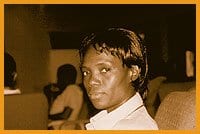On the morning of Sat, Oct 2, I dipped in to my home-based office to check my e-mail before breakfast. I manage an international e-mail list as part of my work with ARC International and there tends to be messages posted throughout my sleeping hours. I was not prepared to see an e-mail from Scott Long with Human Rights Watch about the murder of African activist Fanny-ann Eddy. My kids still refer to that day as the one that “mama cried in front of her computer all day.”
Many Xtra readers won’t know the name Fannyann Eddy. I’m sure you would have, in due course, had she been able to continue to rise as one of Sierra Leone’s (and Africa’s) courageous warriors in the battle for queer rights. Unfortunately, on the night of Sep 29, she was brutally murdered in the office of the Sierra Leone Lesbian And Gay Association (SLLAGA).
Eddy was well known in human rights circles within Africa. Members of the group Gays And Lesbians Of Zimbabwe (GALZ) shared their praise and admiration for her in the following excerpt from an announcement they issued after her death. “In 2002 she came to the GALZ offices in Harare, Zimbabwe looking for assistance in the setting up of an LGBT [lesbian, gay, bisexual, trans] group in her home country, Sierra Leone. It was obvious she had all the determination and willpower to do so. Even in Zimbabwe, where she was a refugee, she brushed with members of our police force and others who tried to threaten her because she was lesbian. Naturally, she refused to be intimidated.”
Eddy went on, not only to work within her own country, but to become involved in the All-Africa Rights Initiative (AARI) and the newly formed Coalition Of African Lesbians (CAL). Her passion was unending and became evident to me when we met in Geneva last spring where she gave a thought-provoking panel presentation and brilliant oral intervention at the United Nations Commission On Human Rights (UNCHR).
As well as articulate, Eddy was unabashedly flirtatious, always wearing a smile. She was also enormously dedicated to her 10-year-old son, whom she called every day from Geneva. I can’t even fathom the personal risk she endured engaging in LGBT activism at the local, regional and international level. As a number of her friends in the international queer community have pointed out, had she known the costs she would have done it anyway.
Part of my grieving is connected to the fact that a number of the activists engaged in work at the UNCHR will be meeting again in Geneva in December to strategize and further develop our coalition. There will be a painful gap without Eddy’s presence. The night she was murdered in her office was the same night she had sent us her application to come to the December meeting.
Part of why I was asked to write this as a commentary rather than as a report is that the facts surrounding her death are uncertain. And unfortunately, they may always be. The only person who could likely speak to the intent and nature of the crime is dead. Speculation has been vivid and emerging from many corners. Initially, it was important for me to follow that speculation and understand the nature of the attack. It has become much less so.
When anyone in our communities is murdered, especially while sitting in the offices of a lesbian and gay association as Eddy was, the effect on our communities is the same, no matter the motive or nature of the murder. The value of our lives becomes evident when dealing with police and the criminal justice system. The level of fear in our community is elevated and the silence can become deafening. And a young son has to suffer not only the injustice of losing his mother, but the indignity of public reaction to her death.
Ultimately, the greatest testament to the life and work of Eddy is reflected in some of her own words: “[D]espite all of the difficulties we face, I have faith that acknowledging the inherent dignity and respect due to us can lead to greater respect for our human rights,” she said as part of her oral intervention at the UNCHR last spring. “The liberation struggle in South Africa, where the constitution includes sexual orientation, shows that respecting human rights can transform society.
“Silence creates vulnerability. I urge you, members of the Commission On Human Rights, to break the silence. You can help us achieve our full rights and freedoms, in every society, including my beloved Sierra Leone.”
* On Fri, Oct 29 Gays And Lesbians Of African Descent (GLAD) presents Reflecting On Courage, Loss And The Struggle For Visibility: The Life Of Fannyann Eddy, from 7 to 9pm at Women’s Health In Women’s Hands (2 Carlton St, Suite 500). A fund has been established to support Eddy’s son. Donations can be sent to the attention of Notisha Massaquoi at Women’s Health In Women’s Hands, 2 Carlton St, Suite 500, Toronto, ON, M5B 1J3.
Kim Vance is codirector of ARC International, a Canadian-based not-for-profit organization working to advance international queer equality.

 Why you can trust Xtra
Why you can trust Xtra


